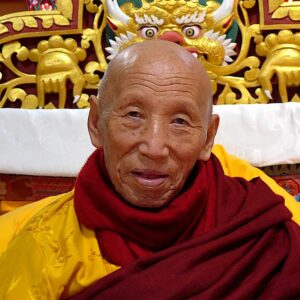We hear a lot about reducing ego in Buddhist teachings. But we often don’t know how to go about this. Here Rinpoche gives practical advice on how to go reducing ego. We can work on reducing ego directly or indirectly.
Rinpoche first talks about the five negative emotions. It helps to use a solid example. He relies on a physical demonstration to teach how things are connected. We can use our five fingers to remind us of the five negative emotions, or five poisons.
These five negative emotions are:
- Anger or hatred
- Pride
- Jealousy
- Attachment or desire
- Ignorance or not seeing
Rinpoche gives one example based upon one emotion. He uses anger. Anger is an emotion. Where does this angry thought arise? It arises based on judgment. We can look at our anger and experience it strongly. Then let’s investigate. What produces the continuous experience of these emotions? Does it come from something outside?
Arm as Example
The five emotions accompany judgment and constant comparison. Rinpoche uses the forearm connecting to the hand to show how this works. Again, we can investigate by observing our own situation.
We can look at emotions and experience them. But we can take it further; we can ask who is experiencing. What accompanies them? And what produces the continuous experience of these emotions? Does it come from something outside? Who is judging? I am judging! It is the ego.
The ego is represented by the shoulder. It is not seeing the ego clearly that causes the trouble. We never ask the question –who is this I? Ignorance helps us not to see this.
Rinpoche explains that we can work on reducing individual emotions. Working on the emotions reduces ego-clinging in a slow, indirect way. Working on the judging/comparing mind also is a way of reducing ego. The most direct way is to examine the ego directly. But this is the most difficult as well. If we are interested in taking that step, it helps us to learn to meditate and reflect in this way. You may want to explore Samye Institute’s short Training the Mind: An Introduction course to explore that topic.











Responses